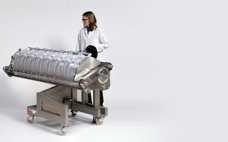In order to deliver cell-based therapies on a commercial scale, cell therapy companies and suppliers must form partnerships in order to overcome existing manufacturing, regulatory, and analytical challenges. Four leading cell therapy experts discuss what is and what has to be done in order to accomplish this objective.
Saturday, September 1, 2012 Daily Archives
Utilization of Allogeneic Liver Progenitor Cells Expanded from Adult Healthy Human Livers to Treat Genetic Disorders
Promethera Biosciences presents this case study detailing how HHALPC from normal adult livers can be purified, expanded In vitro and utilized to successfully treat patients with Crigler-Najjar disease.
Moving Cell Purification Methods from Bench to Bedside
The technological innovations and improvements to cell purification and other cellular analysis-based processes have dramatically increased sample throughput rates resulting in an improved ability to treat cancer, autoimmune diseases, and a range of applications in regenerative medicine.
Tackling the Challenges in the Manufacturing of Cell-Based Therapies
While cell-based therapies offer huge potential, significant challenges, including GMP manufacturing, scaling-out, and delivery must be addressed and overcome in order to justify and successfully autologous and allogeneic provides to the market.
From R&D to Commercialization: Challenges for Cell Therapy Manufacturing
In order for cell therapy companies to successfully evolve from R&D to commercialization, there are many lessons learned from the protein business that can be applied to the cell therapy market.
New Downstream Harvest Options Using Custom Designed Disposable Resins
Engineered affinity resins create the ability to produce functional proteins on a solid support in vivo which can lower production costs, improve flexibility and increase scale up speed.
Next Generation PEGylation Technology
Decreases in the immunoreactivity of next generation PEGylated drugs may be attainable by the use of monofunctionally activated hydroxyPEGs instead of methoxyPEGs in their synthesis.
Single-Use Depth Filtration for Mammalian Cell Culture Clarification
Clarifying cell culture broth is the first downstream unit operation in an elaborate sequence of steps required to purify a biological therapeutic. A combination of centrifugation, depth filtration, or tangential-flow filtration (TFF) is used for that operation. The availability of large-scale, single-use, depth filtration technology in the recent years, however, has given process developers the capability to improve and simplify downstream processes.
New Technology for Broad Screening of Cell Microbial Contaminants, Including Viruses
Two case studies are presented highlighting the impact PLEX-ID System can have to rapidly identify virus contaminants resulting in better control of biologics manufacturing process, with the potential to characterize various sources of excursion through genotyping information.
Implementation of a 2000L Single-Use Bioreactor and Clarification System at an Existing cGMP Facility
This case study highlights a seven month project to upgrade a 100L stainless steel facility to a 2000L single-use facility without affecting current clinical manufacturing while adhering to cGMP requirements.





